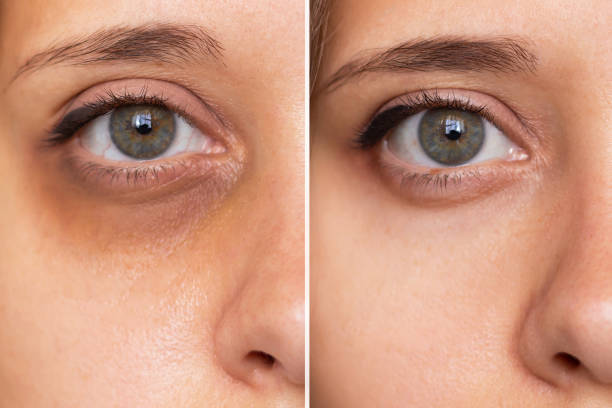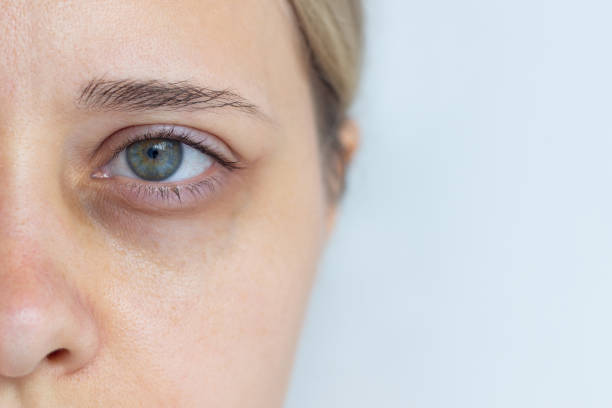Pregnancy can bring about a myriad of changes, some more discussed than others. While morning sickness and cravings are well-known counterparts of a positive pregnancy test, other less obvious signs may also surface. Among these, the appearance of dark circles under the eyes has frequently been debated by expectant mothers. In this article, we’ll explore the possible connection between dark circles and pregnancy. Are these uninvited under-eye changes a reveal of impending motherhood, or simply the result of other stressors? Let’s delve into this dusky dilemma.
Understanding Dark Circles: More Than Just Fatigue

The skin beneath our eyes is particularly thin and delicate, making it a canvas for various internal and external factors to paint their effects. Heredity plays a prominent role—if your parents had dark circles, chances are you might too. Beyond genetics, aspects such as sleep patterns, age, and lifestyle choices like smoking and alcohol consumption can exacerbate the darkened appearance. Additionally, allergies and dehydration are common culprits of this condition. The confluence of these factors make dark circles a common concern, but not necessarily a standard bearer for pregnancy.
Could Dark Circles Be a Sign of Pregnancy?
The link between pregnancy and dark circles is not unfounded. Hormonal fluctuations—which are rampant in early pregnancy—can cause dilation of blood vessels. This, coupled with an increase in blood volume, can bring on the appearance of dark circles. Furthermore, as any expecting mother can attest, sleep can become a precious commodity, and the lack thereof can darken the under-eye area even more. But to understand this sign properly, we need to look at it in the context of other early pregnancy symptoms.
The Early Signs of Pregnancy

Dark circles may be a potential indicator of pregnancy, but they should certainly not be isolated from other symptoms. Here’s a list of early pregnancy signs that, together, could form a stronger indication of pregnancy:
- Missed period
- Nausea or vomiting
- Breast tenderness or swelling
- Increased urination
- Fatigue
- Food aversions or cravings
Should you experience a combination of these symptoms along with dark circles, a pregnancy test or a doctor’s visit may be the next step for confirmation.
Pregnancy and Skin: A Hormonal Balancing Act
Hormones have a direct line to the skin’s appearance. During pregnancy, the body undergoes significant hormonal shifts that can cause a variety of skin changes. The increased levels of estrogen and progesterone can affect melanin production, leading to pigmentation issues. This hormonal dance, while necessary for the development of your baby, can sometimes result in less welcome changes like melasma, stretch marks, and of course, dark circles under eyes.
Managing Dark Circles During Pregnancy
Pregnancy doesn’t mean you have to resign to new beauty woes. There are safe and effective ways to manage dark circles:
- Focus on Sleep: Strive for 7-9 hours of quality sleep.
- Hydration is Key: Drink plenty of fluids throughout the day to stay hydrated.
- Skin Nutrition: Ensure your diet is rich in fruits, vegetables, and proteins that support skin health.
- Gentle Skincare: Use mild, hypoallergenic products to reduce irritants.
- Cold Compresses: Apply cool temperatures to constrict blood vessels and reduce dark circles.
- Elevate Your Head: Sleeping with your head slightly raised can prevent fluid from accumulating under your eyes.
When to Consult a Professional
While many at-home remedies can successfully treat dark circles, it’s important to have a threshold for seeking professional help. If the dark circles are unusually pronounced or accompanied by significant swelling, it may be time to visit a healthcare professional. Furthermore, if you have concerns about any skin changes during pregnancy, your doctor or a dermatologist can offer guidance tailored to your needs.
Conclusion
The appearance of dark circles under the eyes during early pregnancy can be attributed to a variety of factors, ranging from hormonal changes to sleep disturbances. While they may hint at a growing life within, they are not a stand-alone indicator of pregnancy. For any expectant mother worried about under-eye darkness or any other skin concerns, the best approach is a balanced diet, proper skincare, and consultation with healthcare professionals. With the right care, you can focus on the joy of pregnancy while addressing this and other minor cosmetic changes.
FAQs About Dark Circles and Early Pregnancy
| Question | Answer |
|---|---|
| Can dark circles under eyes be a definitive sign of pregnancy? | No, dark circles under eyes are not a definitive sign of pregnancy. They can result from various factors and should be considered alongside other symptoms. |
| How can I safely reduce the appearance of dark circles during pregnancy? | To safely minimize dark circles during pregnancy, focus on adequate rest, proper hydration, gentle skincare, and a balanced diet. |
| Are there any over-the-counter remedies for dark circles that should be avoided during pregnancy? | Yes, pregnant women should avoid products containing retinoids, salicylic acid, and other strong chemicals. Always consult with a healthcare provider before starting any new skincare treatment. |
| When should I be concerned about dark circles under my eyes during pregnancy? | Consult your healthcare provider if dark circles are accompanied by swelling, pain, or if you’re concerned about your overall skin health during pregnancy. |
| Can changes in my sleep pattern during early pregnancy cause dark circles? | Yes, changes in sleep patterns, commonly occurring during early pregnancy, can contribute to the development of dark circles due to increased fatigue. |
